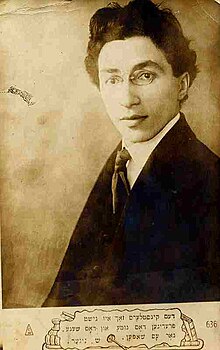Shmuel Niger
| Shmuel (Samuel) Niger | |
|---|---|
 |
|
| Born |
Shmuel Ṭsharni 15 June 1883 Dukora, Minsk Governorate |
| Died | 24 December 1955, age 72 New York City, New York |
| Nationality | Russian Empire, United States |
| Other names | Samuel Niger, Samuel Charney, Shmuel Ṭsharni |
| Occupation | Yiddish literary critic |
Shmuel Niger (also Samuel Niger, pen name of Samuel Charney, 1883-1955) was a Yiddish writer, literary critic and historian and was one of the leading figures of Yiddish cultural work and Yiddishism in pre-revolution Russia.
Shmuel Niger was born Shmuel Ṭsharni on 15 June 1883 in Dukora, a small village in Minsk Governorate, to Zev Volf and Brokhe Tsharni (née Hurwitz). His father, a fervent Lubavitcher Hasid, died in 1889, leaving Shmuel’s mother a widow with five sons (he being the fourth) and a daughter. Niger’s two younger brothers also achieved renown. Baruch Charney Vladeck (1886–1938) became a leading socialist agitator and theoretician, general manager of The Jewish Daily Forward and New York City alderman while Daniel Charney (1888–1959) was a celebrated Yiddish poet, writer and journalist.
Niger was a child prodigy, studying Talmud until the age of 17 at yeshivas in Berezin and Minsk. He was preparing for rabbinic ordination when he instead moved into the secular and political world, having become attracted to secular culture and Zionism. In 1904, he co-founded the Zionist Socialist Workers Party, and was a writer for the party paper Der Nayer Veg (The New Path). He was imprisoned and tortured for his political activity several times in Minsk, Kiev, Warsaw, Daugavpils (Dvinsk), Odessa, and Vilna, but he avoided execution after the intervention of family and friends.
After initial literary forays in Russian and Hebrew, he wrote, published and worked as an editor for many different Yiddish periodicals in Vilna, St. Petersburg and Moscow. His 1907 essay on Sholem Asch's drama Meshiekhs tsaytn (The Age of the Messiah) was his first significant Yiddish critical article and also helped to introduce the still relatively unknown Asch to a much broader audience. In 1908, together with the Bundist dramatist A. Vayter and the Zionist essayist S. Gorelik, he founded the short-lived journal Literarishe Monatshriftn (Literary Monthly Journal) in Vilna, which is widely credited with having launched the Yiddish literary renaissance. The journal, while only publishing four issues, contained works of the bright young hopefuls of Yiddish literature, including Sholem Asch, Dovid Einhorn, Peretz Hirshbein, Hersh Dovid Nomberg, and Der Nister. Niger’s own essays on Asch, Nomberg, I. L. Peretz, and Avrom Reyzen set the high literary tone of the journal and heralded a level of literary and critical sophistication unprecedented in Yiddish literature.
...
Wikipedia
